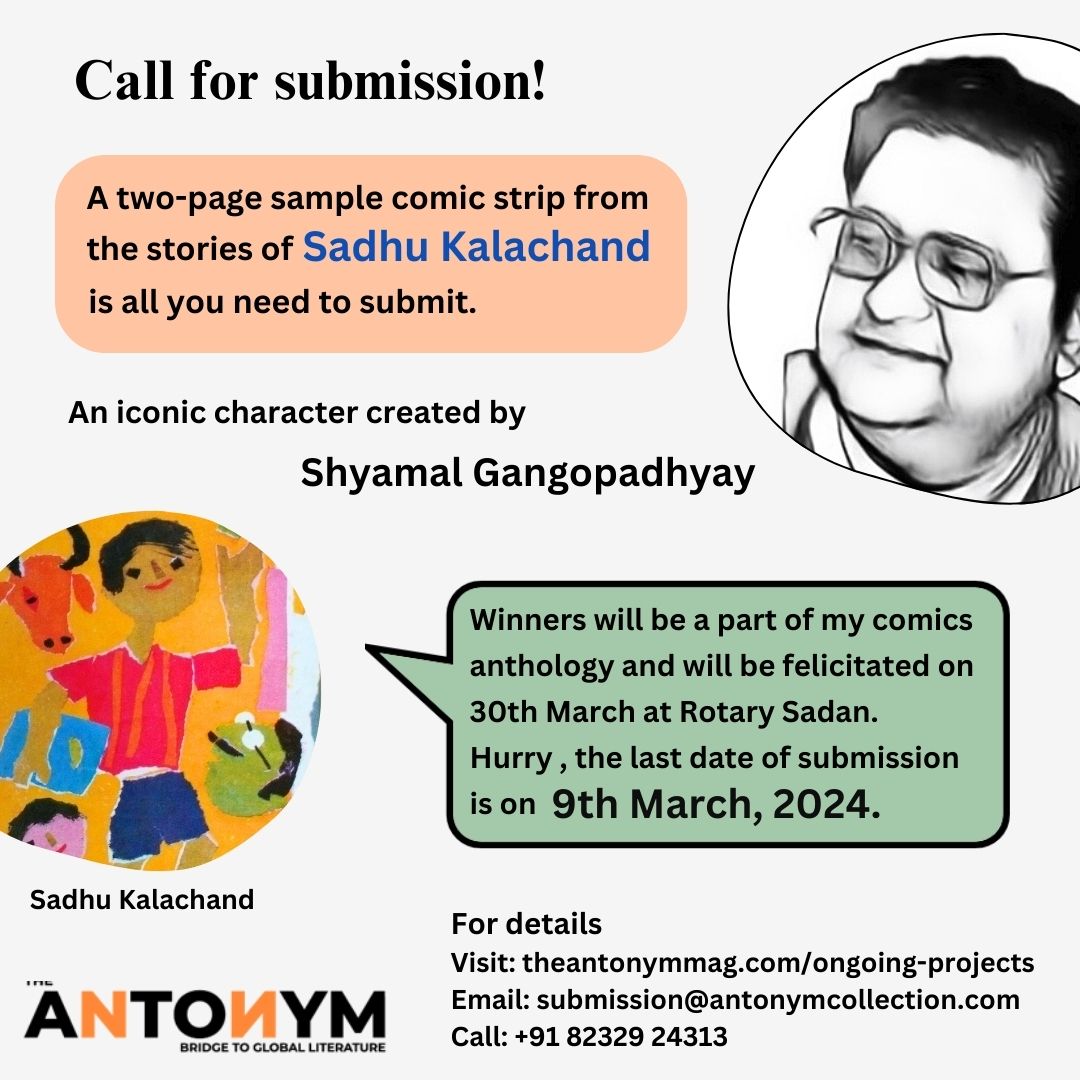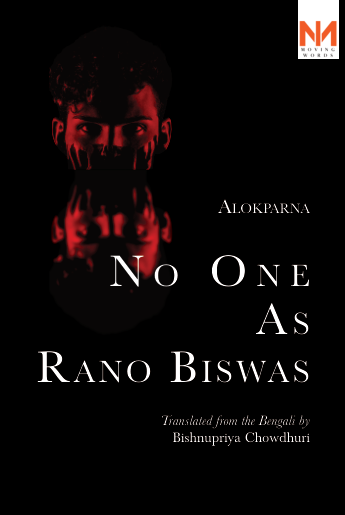TRANSLATED FROM THE BENGALI BY NANDINI GUPTA
Part 1
Squatting by Kalam Molla’s pond to clean himself before Iftar, a recently -aged Giyas Ali, sees Kalam Molla’s seven-year-old daughter, Yasmin run through the bamboo grove, sounding of horse hooves. This interrupts the flow of his arms moving and the water lands on his chest instead of his face, and wets his shirt. With his chest wet, he feels the urge to touch something soft. He saunters to the sabeda tree, stands below it and looks around for Yasmin. He does not find her; he feels the caress of the tree’s dark shadow on his body. But Giyas Ali is not a man to be distracted by a little petting. Therefore, he leaps. Leaping again and again with his arms outstretched, he finds a sabeda fruit within his reach. Again, and again, he flings the fruit up and then catches it. He peers into the bamboo grove, and chuckling, strokes the fruit skin. Still chuckling, his fingers pierce its soft pulp and encounter the wondrous sleekness of two elongated black seeds, and he again hears the hoofbeats of horses come from within the grove. Afterwards during Iftar, he chews on uncooked grams with bits of ginger in it, and when a bit of gram skin sticks between his teeth, he tastes hoofbeats sounding from inside the grove. This is the second time that Giyas Ali tastes sound. When he later tells his wife, Akina Bibi quickly offers up two rakats of Nafil Namaz, she mashes in milk a few bananas plucked the day before and feeds him with her hands.
Akina Bibi says, “Will you show me her?”
Giyas Ali answers, “I’ll look out for her, and show you in a couple of days.”
But before he glimpses Yasmin a second time, he becomes crazed with love. He cannot hold still when the evening breeze begins to blow, he stops the sewing machine and goes to Kalam Molla’s pond. He stands beside the water and peers deep into it. Could be that deep below the water, a mudfish flaps its tail in the dark mud; the heat it generates makes Giyas Ali standing on the bank break into sweat. At that, he yearns to eat some beef heart. The next day he gets a kilo of beef heart from the butcher’s, and tells Akina Bibi, “Make a fiery curry of it.”
Akina Bibi cuts them up and soaks them in a basin of water. Giyas Ali comes into the kitchen, picks up a piece and keeps turning it in his hand. Akina Bibi asks, “What’s the matter?”
Giyas Ali stares at Akina Bibi silently for some time. Then he says, “Look.” He holds the piece in front of Akina Bibi and says, “This one is riddled with holes, do you see?”
Akna Bibi says, “Hmm.”
Giyas Ali says, “This piece comes from a mother cow. Her calves were butchered before her. She kept looking for her calves. She mooed and howled, mooed and howled, and that made a hole in her heart.”
At mealtime, Giyas Ali says again, “A heart with a hole in it does not taste good. It tastes of sand.”
Akina Bibi answers, “Holes don’t make things taste of sand. Things that have unhappiness inside them taste of sand.”
Giyas Ali asks, “What do you mean?”
Akina Bibi answers, “Do you remember the time I lost the baby?”
GIyas Ali says, “Yes?” Akina Bibi answers, “I was taking the rice pan off the fire when something billowed inside my stomach. I put the pan on the floor and tried to straighten up but found that my spine had frozen. I had pins and needles in my feet. I would have fallen if your Dadi had not helped me to the rope cot and lay me down. I lay there squirming. You too were away at the Chilla Jamaat meeting. Later in the night I felt a bit better. I didn’t know when I had fallen asleep. But in my sleep, I kept hearing the blasts from a horn. It sounded like the morning siren from the shoe factory, and with my eyes closed, I thought it was morning. But when I opened my eyes, I found your grandmother, Dadi, holding up a lamp to my face. I asked, “O Dadi! Why do you have a lamp in the morning?”
She asked, “Did you take some roots or leaves to get rid of your belly?”
She then lifted the clothes off my back, held them up to the light, and said, “Look!”
The red fabric was dark with blood. In the morning, Dadi gave me some rice left over from the day before, with mustard oil and onion slices. But who could eat at a time like this! I put a few grains of rice into my mouth, but they felt sandy. I could not eat. Dadi had already sent word to Bajjan Dada. He came with his rickshaw and honked in front of the house. Dadi said, “Wait a bit, son!”
But Bajjan Dada was in a hurry. Finally, Dadi helped me onto the rickshaw. On our way to the hospital to have my sac flushed, we saw some of our village honchos up the road, huddled together deep in conversation. Bajjan Dada said, “A ship full of sand has got stuck in the river bed. It is unable to move further up the river.”
Dadi said, “It was the ship horns you heard last night?”
I said, “But the food I ate just now, also felt like sand in my mouth.”
Dadi asked, “Is the ship carrying only sand? Not people?”
Bajjan Dada answered, “Only as many as you need to sail the ship. But it seems that they are not allowed to disembark. Kalam bhai says he wants to go on my rickshaw to have a look at the ship. I will drop you at the hospital, and come back for him.”
Dadi said, “I have heard of ships laden with gold and silver. This is the first time I am hearing of sand-filled ships.”
Akina Bibi stops for a bit, then looks at Giyas Ali and says, “As long as the baby was inside me, I was never sick or dizzy. But after he came out, I had waves of nausea. As if the baby had found its way into the sac after being expelled. I threw up again and again after reaching home. And for a long time after that, everything tasted of sand.”
When Akina Bibi stops, Giyas Ali places his hand over his wife’s stomach and shivers. Akina Bibi says, “What?”
Giyas Ali does not reply. He senses the dangling possibility of tiny feet, the curve of lips and of earlobes, feels their shape. Giyas Ali asks, “Like this?”
Akina says, “Hmm.”
Rustam Miyan is an eminent master tailor of this area. Earlier, Giyas Ali would go to Rustam’s porch to do his sewing. A few years ago, he bought a sewing machine. Now, he gets the fabric from Rustam Miyan, but sews at his own home. Every week he sends the sewn stuff back to Rustam. Like every week, he is on his way to get the week’s clothes, when he comes across a cow chewing cud below Khalek Miyan’s mango tree. Giyas Ali wonders who the cow belongs to. He stops beside the mango tree. A crow flies down from a branch of the mango tree and perches on the crow’s horn. Yet the cow does not budge. The crow then pecks at the cow’s ear with its beak. At that, the cow nods off with pleasure. She flaps her ears from time to time, and smiles as she chews cud. Giyas Ali is suddenly happy at her pleasure. He pets her back. He whispers into her ear, “Mother Cow.” The cow blinks, flaps at flies with her tail. Giyas Ali tickles her mug and says, “I have a question.”
“Hmm.”
Giyas Ali says, “On the day of Quyamat or last judgement, we will each get our due. We know that. But it also says in the Book, torment begins right after burial, as soon as you are ten steps away from the janaja kabar (grave). But how can punishment come before judgement?”
The cow ignores Giyal Ali and smirks. Giyas Ali says with irritation, “Why do you laugh? Am I being childish?”
“Hmm!”
Giyas Ali says, “What then is the answer?”
The cow flaps its ears a few times till the crow flies away—
“Each day every day,
Know this my brother,
When the day passes,
It will be gone forever.”
“What do you mean?”
The cow laughs.
Giyas Ali says, “You mean I have left some important life’s task undone? You mean you know that some things are happening in my life? If you know everything, why don’t you give me a straight answer?”
The cow says again—
“Each of your days in vain are spent
When they are gone you shall repent.”
Giyas Ali doubts no longer. He says, “So you know all? How did you find out about the things that I saw in the month of Ramzan?”
The cow is silent for a while, and then stands up. She lifts her tail high and pees. As she pees, she says—
“Never again this precious life will you find,
Do your daily chores with that fact in mind.”
Giyas Ali can no longer contain his anger. He says, “I have not missed a single Roja in the month of Ramzan. What do you mean? My life counts for nothing? Haven’t I done good deeds in my life?”
He stamps on the ground and leaves. He loses his way and arrives at Khalek Miya’s doorstep, then realises his mistake and proceeds towards Rustam Miya’s porch.
On the other hand, Akina Bibi does not get to see the girl who makes the sound of horse hooves when she runs, and starts complaining. Every time she sees Giyas Ali, she asks, “When will you show me?”
Giyas Ali himself has not set eyes on her a second time. How can he answer! Akina Bibi refuses to understand. She insists that she must see the girl, no matter how. So Giyas Ali attempts to distract her. He says, “Khalek Miya’s mango tree is a man-eater.”
Akina Bibi says, “Trees don’t have teeth. How can they eat humans?”
Giyas Ali begins his tale—
Khalek Miya’s mango tree bore enormous fruits in earlier days. They did not taste good after they ripened. But the taste of the unripe mangoes spoke directly to the heart. The tree dated from Khalek Miya’s grandfather’s time. So, the tree had a special place in the heart of Khalek Miya’s father. Once in a storm, a parrot’s nest fell off one of its branches. It fell with a nestling still in it. One late afternoon, some of us kids went to the tree to steal some mangoes. We found Khalek Miya’s father bathed in that evening yellow light that touches a bride’s beauty with magic, standing under the tree with the bird in his hands. I went up to him and asked, “What is it, Chacha?” Khalek Miya’s father said, “It’s dead.”
“Who is dead?”
“The bird.”
Our hearts trembled. Why, in that afternoon, in that yellow light was a pious man standing under a tree with a dead bird clasped in his hands? Khalek Miya’s father asked, “Why are you here? Did you come to say Janaja prayers for the dead bird? Come, come to me.”
“The harder Khalek Miya’s father called, the farther we fled. When he came after us, we ran away. We heard later that he waited under the tree till late into the night. Then he plucked out the bird’s feathers one by one, dug a grave under the tree and buried it. Only after that did he go home.”
Akina Bibi asked, “What did he do with the feathers?”
“That’s another story.” Giyal Ali began. “Headman Altaf was a Union Board member. The place was rife with rumours about him. At the time, we were still on the brink of adulthood. We were thus not privy to such gossip. One day we saw as many as two ghagra-skirts drying on his boundary wall. Our women don’t wear ghagras, never have. Who did these belong to, then? We heard later that the Headman had just married a third time. His third wife was a Baiji, a nautch girl. The ghagras were hers. Every night the headman puckered up his mouth, and whistled like a bird for his wife. At that, his wife lifted her ghagra high, twirled round and flew to him in a flash. Khalek Miya lived right next to them, with his family. At night, Khalek Miya’s father would hear the Headman’s bird-chatter. It agitated him, he could not rest. They say he had stored the parrot feathers inside his pillow. When he heard the bird-chatter, he felt a flock of parrots flying through his right ear towards the left one, piercing through the soft sheath of his brain. Night after night he could not sleep. During the day, his heart thumped wildly. As though someone was digging through his heart with a crowbar. Unable to bear the torment any longer, Khalek Miya’s father went to Headman Altaf and handed him the pillow, saying, “Give her this pillow.” When Headman Altaf stared at him in bewilderment, Khalek Miya’s father cleared his throat and with a slight smile said, “Your wife is the bird of our Mohalla. So, I’ve brought her this pillow.”
Headman Altaf was quite powerful at that time, as a union board member. He was infuriated at Khalek Miya’s father for calling his wife a bird. He fumed at the nostrils with anger. The heat from his breath caused Khalek Miya’s father to sweat so hard that he almost died. Yet Headman Altaf’s anger was not appeased. A fortnight later, the tree planted by Khalek Miya’s grandfather bent down like a milch cow, under the weight of its own fruit. Headman Altaf got some young boys from the village together, and they pelted the tree with stones till all the fruit fell, which he then distributed in the Mohalla. But if a tree has life, why should it not have pride too?
Giyas Ali throws the question at Akina Bibi.
Akina Bibi asks, “How so?”
Giyas Ali said, “Some of the branches of the tree managed to grab a couple of the stones pelted at it. A few months later, Headman Altaf’s eldest son was passing under the tree. Suddenly, a rock slipped from the top of the tree and fell on his head. At the Janaja prayers of the eldest son, we stood by and watched Headman Altaf cry. He was a large man but after his son’s death his back broke. Nobody ever saw him stand up straight again.
Akina Bibi had never met Headman Altaf. He had died long before she married into this village. Yet she clearly sees Headman Altaf walk with a crouch below Khalek Miya’s mango tree. That immediately reminds her of the third wife’s green skirts drying on the boundary wall. She looks up and sees a parrot seated on a stool pedalling away at a sewing machine.
One afternoon, Akina Bibi tied a knot in a green handkerchief and gave it to Giyas Ali, “Dangle this from your hand on the way to the Fajr Namaz tomorrow.”
Giyal Ali looks at the knotted handkerchief and asks, “What is in here?”
Akina Bibi says, “Two parrot feathers and a date.”
Giyas Ali asks, “What is the parrot feather for?”
Akina Bibi says, “Birds made nests on the body of Khalek Miya’s mango tree. Was that what made the tree a man eater? Or did the birds nest there because it was a maneater?”
Giyas Ali says, “What do you mean?”
Akina Bibi says, “What sound does she make when she runs, she whose sight has crazed you with love?”
“Of horses.”
“One horse or many?”
Giyas listens, as if hearing the sound again. Then he says, “Many.”
“When else would you hear the hoofbeats of many horses?”
“When there’s a war.”
“What else happens during a war?”
“Men die.” Giyas Ali starts up at his own words. “Are you saying that Kalam Molla’s daughter is a man-eater?”
Akina Bibi says, “A parrot feather befits only her.”
Giyas Ali says, “And the date?”
Akina Bibi says, “That has no reason.”
The next day Giyas Ali wakes up well before the Azan for the Fajr Namaz He turns to his side and sees that Akina Bibi is dead to the world. She is fast asleep with her legs spread out. Giyas Ali slowly leaves the room, washes, pulls some clothes on, and stands before the mirror and lines his eyes with surma. The surma makes his eyes smart. His eyes water. From behind him, Akina Bibi says, “Take the handkerchief with you.” He hadn’t realised that Akina Bibi was awake. He is bashful of his wife seeing him with his eyes lined with surma. He dutifully answers, “I’ll be on my way.” Akina Bibi responds, “Allah Malik, god is supreme.”
But when Giyas Ali steps out, everything appears unfamiliar. A fine silk curtain hangs over everything like a mist. He cannot make out objects an arm’s length away. The muezzin’s call for the Fajr Namaz sounds. It seems to Giyas Ali that he last heard this sound aeons ago. He suddenly wants to go back home. With the notes of the azan in his ears, he feels ancient. In his senescence, he finds a likeness to the mango tree planted by Khalek Miya’s grandfather. He realises that Akina Bibi had lied to him. Birds building nests on its body did not turn the tree into a man-eater. Age did. Something seems to click into place in his mind. He now begins to dangle the green handkerchief. When he dangles the handkerchief again, he hears the sound of water again. He stops. He realises he has arrived at Kalam Molla’s pond. Obscured by the mist, the pond with its water sounds, seems as ephemeral as a white egret. He swings the handkerchief again. The white egret flaps its wings and flies away.
The road to the right is the one that goes towards the Masjid. But Giyas Ali takes the wrong turn. Then he loses all sense of direction, and is clueless about which way to go. He takes two steps forward and thinks, if a pond can fly away like an egret, then why do men bury men in soil? Then he gets it; —man’s body can easily mingle with the soil he is buried into because he is himself made of soil. Still, he turns back to glance at Kalam Molla’s pond. His gaze does not pierce through the fine mist cover. He is angry with the pond for hiding itself. He decides not to look back again. He walks for a while and stops when he reaches a wide expanse.
With every breath, a bit of the white fog enters into his chest. It makes Giyas Ali feel as empty as a hot air balloon. Afraid that a gust of wind might blow him away, he reaches out to cling on to something. Just then, some creature walks by him on four feet. He tries to scream but no sound emerges. He stands still for a long time. He waves the green handkerchief. Then his eyes clear, and he sees the cow seated right in front of him, with Yasmin looking his way and smiling at him as she holds out tender leaves of the jackfruit tree to the cow. Giyas Ali holds out the green handkerchief to Yasmin. Yasmin raises her eyebrows to ask, “What?”
The cow chews on the jackfruit leaves and jeers at Giyas Ali. Giyas Ali says, “Here.”
Yasmin asks, “What do you have there?”
Giyas Ali says, “Parrot feathers.”
Yasmin asks, “And the bird?”
Giyas Ali answers, “I don’t know.”
Yasmin unties the handkerchief.
Giyas Ali says, “There’s a date too.”
Yasmin nods.
Giyas Ali says, “That has no purpose.”
The cow looks at Giyas Ali and thrashes her tail.
Yasmin unties the knot and says, “There are no parrot feathers here.”
Giyas Ali is startled.
Actually, Akina Bibi had understood a certain fact within a few months of her marriage to Giyas Ali. Her husband tended to latch on to just a few snatches of their conversation, and holding on to them hoist himself up a tree, to a higher plane. And Akina Bibi, would have to gesticulate from ground level to continue the conversation with the man high above her. After a few months of this, she realised that she had become good at coining new metaphors, and amazingly, Giyas Ali too had learnt to gently penetrate their bodies. One night, Giyas Ali woke up in a sweat. He found Akina Bibi drenched in perspiration too. He asked, “Hyago, why is it so sultry? Is the sky clouded over?” Akina Bibi said, “There was a knock on the door a little while ago. I opened the door to find a couple of areca nuts on the doorstep.” Giyas Ali said, “Oh.” But he had no difficulty grasping that the areca nuts signified that the sky was full of stars, there were no clouds.”
Yasmin bites on the date, and smiles at Giyas Ali. Giyas Ali smiles back. The cow says –
“Make sure you never cause her heart to pain,
If you do, my brother, Khuda you will never attain.”
Giyas Ali says, “I should not even question her when I get home?”
The cow moves her head from side to side.
Giyas Ali says, “Then the bird feather was merely a whim?”
Yasmin says, “And the date?”
Giyas Ali answers, “That had no reason.”
The cow smiles.
Giyas Ali says, “What?”
No one responds. He sees the hazy outline of a long-distance train galloping through the mist. When he looks intently, Giyas Ali sees himself seated at a window on that train.
Yasmin asks, “And then?”
Giyas Ali replies, “Like this.” –
Once, Giyas Ali returns from a chilla jamaat and finds a few sacks of sand piled under their bed. No masons have been working at their home, where have so many sacks of sand come from?
Akina Bibi says, “I cannot tell you now.”
Giyas Ali loses his temper. Akina Bibi says, “Your son died inside my womb, and you are throwing a tantrum!”
Giyas Ali realises his mistake. His eyes fill with tears. Akina Bibi says, “The one who died had not yet acquired human shape, would he have hurt the same way as a human would when he was yanked from my stomach?”
Giyas Ali says,” If he was not like a human, how can anything related to him be accounted in human terms?”
Akina Bibi says, “But he was inside my womb in order to grow into a human. So, he must have had human qualities within him. He just didn’t have enough time to grow into a human, that’s all.”
Giyas Ali says, “That’s true.”
Akina Bibi says, “Then?”
Akina Bibi says, “There is a bit of difficulty here.”
“How so?”
Giyas Ali says, “Our child did not acquire human form. So, there was no entry for him in Allah’s register.”
Akina Bibi says, “But if he had been conceived in the month of Roja, and stayed inside me till Id, you would have given Fitr alms in his name. Why give Fitr in someone’s name if his name has not been entered by Allah in his register?”
Giyas Ali has no answer. But the thought sticks in his brain. When early next morning, Rahmat Miya takes him to the Howrah market, he gives him the slip and arrives at Howrah station. After wandering around for a while, he boards a long-distance train.
Giyas Ali had woken before dawn. Now the swaying of the train puts him to sleep. Around noon he wakes up to someone poking him; drowsily he sees a man who could be a fakir, smiling at him. He asks, “What?” The fakir says, “Where are you headed?”
Giyas Ali says, “Don’t know.”
“Then why are you on a train?”
“I have no reason.”
“You don’t know where you are going or why, or how you would manage after you get there?”
Giyas Ali is taken aback. “No, actually not.”
The Fakir says, “That makes you a full-looney.”
Giyas Ali asks, “Who are the half-looney?”
The Fakir says, “Those who are traveling on the train to their destinations. They know where they are going. But they have made no arrangements for their stay there.”
“What do you mean?”
The Fakir said,” This train is just like zindagi, life. We all want to get somewhere. But we are unwilling to make the necessary provisions for staying well once we reach.”
Giyas Ali says, “I have a question.”
The Fakir asks, “What?”
Giyas Ali repeats Akina Bibi’s question. The Fakir replies, smiling. Having got the answer, Giyas Ali does not tarry. He gets off at the next station. On his way home, he buys a banana tree.
On seeing the banana tree, Akina Bibi thinks that her husband is again communicating in metaphors. Giyas Ali says, “Not at all.”
“Then?”
Giyas Ali tells his wife about meeting the fakir on the train. Akina Bibi is overwhelmed. She says, “You did right. If he ever steps into our home, I will pick bananas from this tree and serve them to him with milk.”
Giyas Ali says, “But If I am not at home at the time, how will you know him?
“There’s a way.”
“What?”
“If a person does not cringe with embarrassment if I wipe his wet feet with my knee-length hair, I can tell he is a pious man.”
Giyas Ali nods and enters the room. Akina Bibi goes to the garden to plant the tree. Giyas Ali looks under the bed and sees there are no bags of sand.
Days pass, the year passes, no fakir turns up at their door. But after his conversation with the fakir on the train, Giyas Ali often finds his mind wandering. At such times, given a chance, he slips away; he goes far and does not come home for a couple of days. Rahmat Miya uses that as an opportunity to get close to Akina Bibi. Akina Bibi covers her head with the end of her sari when she talks to Rahmat Miya. She has no inkling of Rahmat Miya’s intentions. One day Rahmat Miya sends word through Kalam Molla. Hearing of Miya’s intentions, Akina Bibi goes red with shame.
A few months later, when she wakes up for the Fajr Namaz, she is alarmed by a shadow on her doorstep. The shadow sways and says, “Do not be afraid. I have come to your door.”
Akina Bibi sees a person looking like a fakir kneeling for Namaz, on a Jaaynamaz mat, on her porch. Akina Bibi immediately washes his feet with a jug of water. Then she unravels her hair from her bun, and wipes his feet with it. After that, she doubts no more.
She goes to the garden and takes down a bunch of bananas before entering the kitchen. She remembers then that she does not have any milk at home. She goes from one house to another in the neighbourhood in search of a quart of milk, but no one is willing to give her any. At last, she shakes off her reluctance and goes to Jamila. Jamila is Giyas Ali’s cousin. Jamila says, “Alas, the cat drank all the milk I had a while ago. Allah is the lord of destiny”.
A dejected Akina Bibi on her way back home meets Kalam Molla. Kalam Molla asks, “Why are you crying Bhabi (sister-in-law)?”
“Will you give me a cup of milk, please?”
“Are you crying for milk?”
Akina Bibi says, “I have a guest at home. I want to serve him some milk and banana. But there’s not a drop of milk left anywhere.”
Non-plussed, Kalam Molla stares at the woman in front of him. Akina Bibi points at her nose-pin and says, “Take this as security deposit, and give me a cup of milk.”
Kalam Molla says,” How can you say that Bhabi? It is a sin, haram to charge interest.”
“Then?”
“There is a way.”
“What?”
Kalam Molla whispers, “Have you forgotten Rahamat Miya? Just a night. If you can satisfy his desire, never mind a cup, he will bathe you in milk.”
At this moment, Akina Bibi is completely engrossed with the problem of feeding her guest. Her mind is wiped clean of all sense of haram and halal, right and wrong. Kalam Molla says, “So Bhabi, there you are. Come with me, I will give you a pot of milk.” Akina Bibi agrees.
She comes home covering the pot of milk covered with the end of her sari. She finds the fakir still seated in the same posture. Akina Bibi mashes the banana into the milk and serves the fakir. The fakir eats and then says, “I will be on my way now.”
“Oh no! He has not yet come home, Baba. Please rest for a while, till he comes back.”
“I got what I came for.” The fakir says as he leaves,” I shall come again if Allah so desires.”
The fakir leaves. It is then that Akina Bibi comes back to her senses. She remembers her promise to Kalam Molla, and is agitated. There is still some milk left in the pot. She gives it to Giyas Ali and says, “Drink this.”
Giyas Ali says, “Milk? Why milk, dear?”
Akina Bibi sits down at her husband’s feet and says, “He came today.”
Giyas Ali looks at his wife. Akina Bibi covers her face. Giyas Ali lifts her face and asks, “What are you saying?”
Akina Bibi cannot speak. Tears roll down her cheeks. Giyas Ali asks again. Weeping, Akina Bibi tells her husband everything. Giyas Ali is not angry. He says, “Allah is testing us.”
At night, it begins to pour. The raindrops beat on the tin roof and drown out conversation. Akina Bibi sets her fear aside and says, “I guess, Allah does not want us to go. That is why it is raining so hard.” Giyas Ali says, “It would be a gunah to go back on our words. Allah is testing us. No matter how hard it rains we have to get there.”
Giyas Ali tells Akina Bibi to put on a new sari. Akina Bibi drapes a rad sari, puts a dot on her forehead, and appears before Giyas Ali. Giyas Ali says, “Let’s go.” Akina Bibi nods.
The path is waterlogged due to the rain. Giyas Ali crosses the road with an umbrella in one hand and his wife in the other. His feet slip once. Akina Bibi holds a four-cell torch in her hand. She switches it on and shows him the way. When the path is lit up, Giyas Ali steps forward and she follows. As she moves, she glances at her husband once. But she cannot look at him for long.
Rahmat Miya’s house, enveloped in rain and darkness, looks deserted. Giyas Ali helps her up to the porch. There is a door to the right. Rahamat Miya’s room is behind that door. Giyas Ali stays secreted in the darkness and tells Akina Bibi to knock. But Akina Bibi does not knock. There is a low wooden stool, a piri. She steps on it and peeps over the door. Then she stays that way and puckers up her lips and makes parrot-sounds. Why does she make parrot-sounds at the dead of night? Giyas Ali swathed in darkness wonders if a flock of parrots has nested on his wife’s body. Maybe if she flounces the end of her sari, a flock of parrots will take flight. Giyas Ali starts up. He sees Rahmat Miya open the door and peer into the darkness to take stock of his surroundings. Seeing nobody around, he pulls Akina Bibi in and shuts the door. But within a short while, the door opens again. Giyas Ali sees Akina Bibi come towards him torch in hand. Rahmat Miya follows.
Akina Bibi shines the torch into Giyas’ face. Giyas Ali shuts his eyes. Rahmat Miya says, “What kind of man are you, Giyas Ali!”
So saying, he drops down to sit on the floor of the porch. Giyas Ali watches as Rahmat Miya squats on the floor, encircles Akina Bibi’s feet with his arms and weeps. Akina Bibi does not appear to be least embarrassed. He switches off the torch in Akina Bibi’s hand. Then, in the darkness, Akina Bibi begins to make parrot-sounds. That is when for the first time, Giyas Ali, tastes a sound— he finds the parrot-chatter soft and delicious like the brain of a cow.
But when they come back home and Akina Bibi asks, “Did you give him the green handkerchief?”, Giyas Ali does not answer. Akina Bibi is wearing a green sari. When she moves her arms, Giyas Ali sees a parrot flapping its wings in the swaying of the dangling end of her green sari. Seeing the parrot secreted in Akina Bibi’s sari-end, he again experiences an urge to defeather the bird standing in front of him. But it is noon already. He smells warm rice and feels hungry. He enters the kitchen with Akina Bibi.
After lunch, Giyas Ali sleeps for a while. Akina Bibi wakes him up with a jab of her elbow. Rubbing his eyes, Giyas Ali asks, “What?”
Akina Bibi replies, “Our village has changed colour.” Giyas Ali does not understand her meaning. He asks, “Is our village painted on paper that it will change colour like at the stroke of a brush!”
Akina Bibi dissolves into laughter.
Giyas Ali says, “In fact, painting a human is Gunah.”
Akina Bibi does not stop laughing.
Giyas Ali says, “What then?”
Akina Bibi says, “Come out to the porch. See how everything has changed.”
Giyas Ali comes out of the house and sees a man in a green shirt, as tall as two storeys of a building, standing on their porch and juggling two balls. Amazed, he continues to stare for some time. He wants to talk to the man. But the man pays him no attention, and keeps juggling the balls intently. From inside the house, Akina Bibi says, “There are more of them wandering around the village. Go and have a look. From afar, they look exactly like lanky overgrown trees.”
Giyas Ali spies two bamboo poles from between the man’s shirt. Akina Bibi says, “They have tied their feet to bamboo poles. They walk on stilts, so they look tall.”
Once more Giyas Ali glances at the man. He would like to ask him his name. But he feels strangely afraid. He takes Akina Bibi’s hand in his and draws her inside. Says, “Do not speak so loudly in front of these people.”
He waits for some time, and asks, “You say there are more people like him visiting our village?”
“So Fatima Bhabi said. Go and see for yourself. Everyone is talking about them.”
Giyas Ali pulls on a shirt over his vest. As he leaves, he tells her, “Do not open the door till I come back. Open only when you hear me calling.”
Akina Bibi says plaintively, “What if someone mimics your voice?”
Giyas Ali says, “What will you do then?”
Akina Bibi breaks into childlike laughter. “When you come to the door, make parrot-sounds. That will tell me it is indeed you.”
She makes a sound like a parrot, and says, “Do this thrice. Only then will I open the door.”
Giyas Ali does not need to go far. When he gets to Jamal Ostagar’s porch, he stops in his tracks. He sees a big crowd and gathers that an urgent meeting is in progress. He mingles with the crowd and realises that Jahir Master is at its centre. Jahir Master teaches at the local makhtab, the primary school for Islamic teaching. Jahir looks around and asks, “What do you say?” The people in the crowd exchange glances. Nobody dares to speak out in front of Master. Only Jamal Ostagar says, “So be it. You have seven days to find out of if there is a plot behind all this.”
Jaheer Master smiles.
Now Giyas Ali speaks out from the crowd. “But Master we have a request.”
Everyone turns towards Giyas Ali.
Master asks, “What?”
Giyas Ali says, “If you can come here each day after the Maghrib Namaz, and …”
“And what?”
“And explain to us, bit by bit, your findings, it would help us greatly.”
Rahamat Miya is seated beside Master. He supports Giyas Ali. Master agrees.
Also, read the second part Giyas Ali’s Love and His Alone Time by Sadique Hossain, Translated from The Bengali by Nandini Gupta and published in The Antonym:
Read a fiction written by Bengali writer Mojaffor Hossain, translated into English by Fayeza Hasanat, and published in The Antonym:
Follow The Antonym’s Facebook page and Instagram account for more content and exciting updates.

































0 Comments